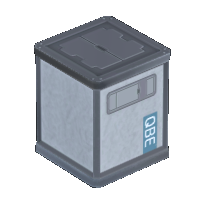Difference between revisions of "Probodobodyne QBE"
From Kerbal Space Program Wiki
m (*update part description;) |
AlpacaMall (talk | contribs) (slight cleanup + match OKTO2 reference to QBE) |
||
| (5 intermediate revisions by 3 users not shown) | |||
| Line 2: | Line 2: | ||
The '''Probodobodyne QBE''' is an unmanned [[command module]] that runs on [[electricity]]. | The '''Probodobodyne QBE''' is an unmanned [[command module]] that runs on [[electricity]]. | ||
| + | |||
| + | == Product description == | ||
| + | {{Quote | ||
| + | |QBE is Probodobodyne's latest development in probe miniaturization. Despite it's diminutive size, the QBE is a fully-functional and incredibly lightweight command unit. All this goodness comes at a price however: The QBE's tiny enclosure means there is no room for internal reaction wheels, and battery capacity is pitiful at best. Despite all this, or perhaps because of it, many engineers have found it to be ideally suited for those 'optional return' missions. | ||
| + | |manufacturer=P}} | ||
== Usage == | == Usage == | ||
| − | Generally placed at the top of the rocket, the Probodobodyne QBE provides full command module functionality. It has a | + | Generally placed at the top of the rocket, the Probodobodyne QBE provides full command module functionality. It has a slightly higher impact tolerance than the other probe cores. The QBE is currently the third lightest command pod, behind only the [[Probodobodyne OKTO2]] and the [[Probodobodyne Stayputnik]]. |
The Probodobodyne QBE features a tiny size node on top and bottom. | The Probodobodyne QBE features a tiny size node on top and bottom. | ||
| − | + | Like the [[Probodobodyne OKTO2]], it is one of the few command modules without [[reaction wheels]]. | |
The QBE is one of the few parts in Kerbal Space Program that is covered in [[w:Multi-layer insulation|multi-layer insulation]]. | The QBE is one of the few parts in Kerbal Space Program that is covered in [[w:Multi-layer insulation|multi-layer insulation]]. | ||
| − | |||
| − | |||
== Changes == | == Changes == | ||
| + | ;[[1.5]] | ||
| + | * New model and texture | ||
| + | ;[[1.2]] | ||
| + | * Added KerbNet | ||
;[[0.18]] | ;[[0.18]] | ||
* Initial Release | * Initial Release | ||
Latest revision as of 23:33, 16 July 2021
| Probodobodyne QBE | ||
| Command module by Probodobodyne Inc | ||
| Radial size | Tiny | |
| Cost | (total) | 360.00 |
| Mass | (total) | 0.070 t |
| Drag | 0.15-0.2 | |
| Max. Temp. | 1200 K | |
| Impact Tolerance | 15 m/s | |
| Research | | |
| Unlock cost | 3 800 | |
| Since version | 0.18 | |
| Part configuration | probeCoreCube.cfg | |
| Electricity required | 1.50 ⚡/min | |
| SAS level | 0 | |
| Field of View | (min) | 13 ° |
| (max) | 72 ° | |
| Anomaly detection | 18 % | |
| Enhanceable | No | |
| Mode | Terrain | |
| Antenna type | Internal | |
| Antenna rating | 5 km | |
| Packed volume | 140 l | |
| Electric capacity | 5.0 ⚡ | |
The Probodobodyne QBE is an unmanned command module that runs on electricity.
Product description
| “ | QBE is Probodobodyne's latest development in probe miniaturization. Despite it's diminutive size, the QBE is a fully-functional and incredibly lightweight command unit. All this goodness comes at a price however: The QBE's tiny enclosure means there is no room for internal reaction wheels, and battery capacity is pitiful at best. Despite all this, or perhaps because of it, many engineers have found it to be ideally suited for those 'optional return' missions. — Probodobodyne Inc |
” |
Usage
Generally placed at the top of the rocket, the Probodobodyne QBE provides full command module functionality. It has a slightly higher impact tolerance than the other probe cores. The QBE is currently the third lightest command pod, behind only the Probodobodyne OKTO2 and the Probodobodyne Stayputnik.
The Probodobodyne QBE features a tiny size node on top and bottom.
Like the Probodobodyne OKTO2, it is one of the few command modules without reaction wheels.
The QBE is one of the few parts in Kerbal Space Program that is covered in multi-layer insulation.
Changes
- New model and texture
- Added KerbNet
- Initial Release
